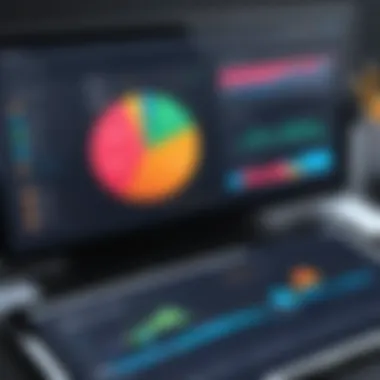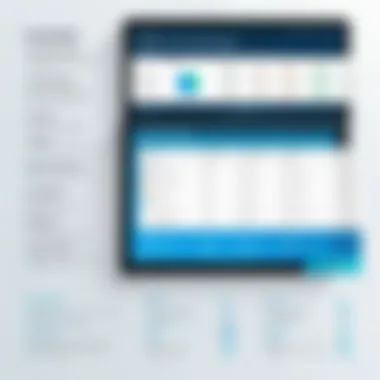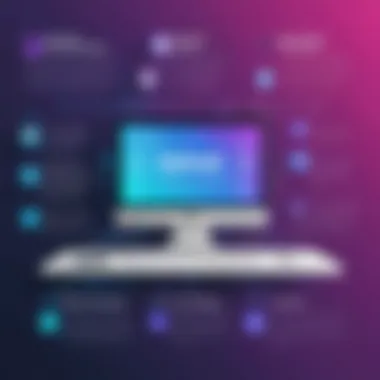Exploring Free Accounting Software: A Complete Guide


Intro
In the current economic landscape, managing finances accurately is paramount for individuals and businesses alike. Free accounting software is becoming increasingly relevant as it offers an accessible entry point for effective financial management. Many organizations, especially startups and small businesses, are exploring basic free accounting solutions that align with their budgetary constraints without sacrificing essential features. This guide seeks to illuminate the intricacies of such software, presenting an examination of key components as well as pertinent user insights.
Software Overview
Basic free accounting software generally embodies a variety of functionalities designed to assist users in their financial management tasks. Key features may include invoicing, expense tracking, and basic reporting capabilities. Understanding these offering is crucial when selecting the right tool.
Software Features
- Invoicing: Many free accounting software options provide templates for creating and sending invoices, allowing for efficient billing processes.
- Expense Tracking: This feature is essential for monitoring spending and managing budgets. Users can categorize expenses and generate summary reports.
- Financial Reporting: A selection of basic reporting tools can help visualize financial data over specific intervals.
- User Management: Some platforms allow multiple user access, which is beneficial for teams collaborating on financial tasks.
- Integration: Open-source options may enable integration with other applications, enhancing overall functionality.
Technical Specifications
Free accounting software options differ significantly in their technical specifications. It's important to consider factors such as:
- Platform Accessibility: Many tools are browser-based, ensuring accessibility from various devices. Others may require downloads on specific operating systems.
- Data Security: Security features vary from one software to another. Users should assess how their financial data is protected.
- Updates and Support: Understanding whether updates are regular and if support channels are available is essential in selecting software.
Peer Insights
Peer feedback can provide valuable insights into the software performance and user experience. Evaluating user experiences enables businesses to gauge the applicability of a tool to their needs.
User Experiences
Users often highlight ease of use as a significant benefit of many free accounting software options. These platforms typically feature intuitive interfaces designed for individuals with limited accounting knowledge. However, some may indicate limitations in advanced functionalities that paid alternatives offer.
Pros and Cons
Identifying the strengths and weaknesses of free accounting software is critical for making an informed decision.
Pros:
- Cost-effective, making it suitable for startups.
- Lower entry barrier for those new to accounting.
- Basic functionalities sufficient for limited financial tasks.
Cons:
- May lack advanced features present in paid software.
- Limited customer support channels.
- Potential issues with data security or compliance.
"Selecting the right accounting software can be the difference between financial clarity and chaos."
Finale
In the quest for effective financial management tools, free accounting software emerges as a viable option for individuals and businesses alike. By understanding the key features, technical specifications, and user insights, one can adequately assess these tools and determine their suitability for specific needs. This knowledge not only enables better financial oversight but also empowers users to make informed long-term decisions.
Preface to Basic Free Accounting Software
The landscape of accounting software has evolved significantly, making access to financial management tools easier for individuals and businesses alike. Basic free accounting software typically provides essential functionalities that help users maintain organized financial records without incurring costs. Understanding these software options is crucial for companies aiming to streamline their accounting processes, especially startups or small businesses that operate on tight budgets.
Definition and Purpose
Basic free accounting software refers to online or downloadable programs that assist users in managing their financial data without any associated fees. The core purpose of these tools is to help users track income, expenditures, and overall financial health through simple interfaces. Often, these applications are equipped with basic features like invoicing, expense tracking, and financial reporting, enabling users to fulfill essential accounting tasks.


These software solutions attract a varied audience—from freelancers to small businesses—who seek efficient methods to handle their accounting needs without financial burden. They offer an opportunity to enhance financial awareness and management skills, thus empowering users with knowledge about their financial status.
Historical Context
The emergence of accounting software can be traced back to the late 20th century, spurred by advancements in computer technology. Initially, businesses depended on manual bookkeeping, which was time-consuming and often subject to human error. As computers became commonplace, companies began to develop automated solutions to streamline accounting processes.
The move toward free software options occurred in the early 2000s, coinciding with the rise of open-source projects and the proliferation of the internet. These developments democratized access to accounting tools, allowing users with limited budgets to utilize software that previously required substantial investment. As a result, new players entered the market, leading to an increase in both the quality and variety of free accounting software available. Companies such as Wave and GnuCash became popular choices, offering robust options for users looking for cost-effective solutions.
The evolution of technology continues to impact accounting software, with cloud computing and mobile access further bridging the gap for users seeking accessibility and convenience. In this context, basic free accounting software serves as an effective foundational tool for many businesses, laying the groundwork for effective financial management.
Importance of Accounting Software
In the contemporary business environment, the significance of accounting software cannot be overstated. Businesses, regardless of their size, require effective systems to handle their finances. Investing in appropriate tools helps to streamline operations and maintain financial order.
Financial Organization
Accurate financial organization is a cornerstone for any successful business. Accounting software enables users to categorize transactions clearly, which aids in tracking income and expenses effectively. This structured approach simplifies the process of budgeting and forecasting. For instance, with software like Wave or ZipBooks, businesses can view their financial status at a glance, which is invaluable for strategic decision-making. Having organized financial data can also foster transparency, enhancing trust among stakeholders.
Time Efficiency
Time is a critical resource for any organization. Manual bookkeeping can be tedious and prone to errors. Free accounting software enhances operational efficiency by automating various tasks. Tasks such as generating invoices or recording transactions can be performed faster and more accurately. For example, using software like GnuCash allows for automation in repetitive tasks, saving precious hours that can be utilized for more strategic activities. Consequently, staff can focus on core business functions rather than getting mired in administrative responsibilities.
Accuracy in Financial Reporting
Inaccuracies in financial reporting can lead to serious consequences, including financial losses and compliance issues. Basic free accounting software significantly reduces human errors, ensuring that calculations are precise. Users can rely on features that provide real-time updates on their financial status, reducing the risk of errors associated with traditional methods. Software options such as SlickPie offer functionality for generating error-free financial reports, thus providing reliable data for managerial decisions. This accuracy fosters a better understanding of a business's financial health and supports accountability.
"The most damaging element of any accounting process is not technology or systems but rather the human element."
Understanding the importance of accounting software is essential for businesses aiming to grow and thrive in a competitive atmosphere. Utilizing such tools can provide not only immediate benefits but lay a foundation for long-term success by ensuring that financial dealings are organized, efficient, and accurate.
Key Features of Free Accounting Software
The landscape of free accounting software is ever-evolving. Understanding which features matter the most can significantly influence the decision-making process for users. In this section, we will explore the key features that should be considered when evaluating free accounting software. Each feature plays a crucial role in efficiency, usability, and the overall effectiveness of managing financial tasks.
User Interface Design
User interface design is central to user experience. A well-designed interface facilitates smooth navigation, allowing users to focus on their financial tasks rather than struggling with complex menus. Simple and intuitive layouts can greatly enhance efficiency. Users should look for software that employs clear icons and logical workflows. A clean and organized display assists in minimizing errors and confusion.
Key characteristic: An intuitive layout and easy navigation are essential. A software product that presents information logically can help users, even those not tech-savvy, accomplish tasks efficiently.
Basic Accounting Functions
Invoicing
Invoicing is a fundamental feature of any accounting software. Its primary purpose is to create, send, and track invoices in a streamlined manner. Effective invoicing solutions enable businesses to manage accounts receivable efficiently. This can have a direct impact on cash flow, improving overall financial health.
Unique feature: Many free accounting solutions offer customizable invoice templates. This allows businesses to maintain brand identity while presenting professional invoices. Customization can enhance customer experience, but it may require additional time to set up.
Expense Tracking
Expense tracking is crucial for understanding spending patterns. It allows users to monitor where money goes, thus making informed financial decisions. The ability to categorize expenses ensures a more comprehensive understanding of financial health. This feature thus aids in budgeting and identifying areas for cost-cutting.
Key characteristic: The categorization of expenses makes tracking easier. Many solutions allow users to import bank statements directly for automatic categorization, simplifying the monitoring process. However, manual entry might still be involved, which can be time-consuming.


Financial Reporting
Financial reporting features are essential for businesses seeking insights into their performance. Reports provide a snapshot of the company's financial status, making it easier to strategize for future growth. Users can generate various types of reports, including profit and loss statements and cash flow statements.
Unique feature: Automated reporting simplifies the process and saves time. Users should look for software that enables the automation of routine reports. Nevertheless, some free options may lack in-depth analysis capabilities, which can limit the insights derived from the data.
Integration Capabilities
Integration capabilities determine how well accounting software can work with other tools. Businesses rely on multiple platforms for operations, such as CRM systems, eCommerce platforms, or payroll services. Quality accounting software allows for seamless integration with these systems.
Importance: Effective integration can streamline workflows and eliminate data entry redundancies. This can save significant time and reduce the likelihood of errors. Users should always check compatibility before settling on a software solution.
Customer Support Options
When using free accounting software, customer support options are often limited. However, quality support can be a crucial element in resolving issues quickly. Users should consider availability of support resources such as knowledge bases, forums, and direct assistance.
Considerations: Comprehensive support resources can make a difference in user experience. Online communities, such as those found on Reddit, can provide valuable insights and peer support. Yet, reliance on community support may not be sufficient for all users, especially those requiring immediate assistance.
Limitations of Free Accounting Software
Understanding the limitations of free accounting software is crucial for users aiming to optimize their financial operations without incurring costs. While these platforms offer valuable features, they may not completely fulfill the requirements for every business model. Users should be aware of certain constraints that can affect overall performance and effectiveness of these tools.
Feature Restrictions
One primary limitation of free accounting software is the restrictions on features. Free software often lacks advanced functionalities that are common in premium versions. For instance, users may find limitations in invoicing options, customizable reporting, or advanced budgeting tools.
For small businesses, basic invoicing and expense tracking are usually sufficient. However, as operations grow, the need for enhanced features may arise. The absence of these functionalities can hinder a company’s ability to analyze financial data effectively or manage cash flow appropriately. Additionally, users may face restrictions on the number of transactions or clients they can manage, affecting scalability.
Scalability Challenges
As businesses expand, the software employed must also adapt to changing needs. This can be a challenge with free accounting software. Many of these tools are designed with limitations that do not support scaling effectively. Users might encounter obstacles like inadequate support for multi-currency transactions or integration with other business tools essential for larger setups.
Transitioning to a more robust platform in the future can also be troublesome. Data migration may not be straightforward, leading to potential entry errors or loss of important financial information. This scalability issue is a significant consideration when choosing a free solution for long-term use.
Security Considerations
Security is another critical concern when using free accounting software. While many free platforms aim to safeguard user data, they may not implement the same level of security measures found in paid software. Users may be vulnerable to data breaches or loss if the software provider does not prioritize data protection.
It is imperative for businesses to carefully assess the security protocols of any software they consider. Verify whether the free service provides essential features like data encryption and regular security updates. For sensitive financial data, having robust security measures in place is non-negotiable. If a software option does not guarantee adequate protection, the risks often outweigh the benefits.
"Choosing the right accounting software is not just about functionality, but also about the security of your financial data and the future growth of your business."
Popular Options in Free Accounting Software
When exploring basic free accounting software, it is crucial to understand the options available. The landscape of free accounting tools can be diverse, featuring various software that meet different user needs. This section outlines popular options in the market, allowing users to identify suitable solutions for managing their financial tasks without cost barriers.
Software Overview
Several free accounting software applications offer basic functionalities suited for small businesses and individuals. Each option comes with its set of features and user experiences. The ability to manage finances effectively without spending on software costs is a major benefit for users. Programs such as Wave, ZipBooks, and GnuCash provide capabilities like invoicing, expense tracking, and simple reporting. By understanding the primary attributes of these options, users can find solutions that align with their requirements.
Software Comparisons
User Ratings


User ratings play a significant role in evaluating free accounting software. They offer insights into the real-world effectiveness and usability of these programs. Generally, high user ratings indicate a dependable package. Wave, for instance, consistently receives positive feedback for its intuitive design and comprehensive features. These ratings help new users gauge which software might best serve their needs based on collective user experiences. Both strengths and weaknesses can easily emerge through these reviews.
Feature Sets
Feature sets describe the individual tools and functionalities provided by accounting software. For a comprehensive analysis, it is necessary to evaluate what features each software includes. Wave, for example, provides invoicing, payment acceptance, and reporting tools. Potential users should prioritize software that offers the specific features they need for their financial tasks. However, certain software might have limited access to advanced features, which can be a drawback for growing businesses seeking more comprehensive solutions.
User Experiences
User experiences provide valuable insights into the practical usage of accounting software. Feedback from users can help identify the usability of the software, customer support efficiency, and the overall satisfaction level. For example, ZipBooks is noted for its user-friendly interface, making it appealing for those less experienced with accounting tools. Analyzing user experiences will enable users to minimize risks associated with choosing the wrong software for their situations.
User-Generated Reviews
User-generated reviews are essential for understanding the real-world applications of free accounting software. These reviews can highlight not only the pros and cons of various options but also offer unique insights into different industries and scenarios. Users often share challenges and successes that may not be evident in product descriptions. Observing patterns in these reviews can guide potential users in selecting the best-suited software for their accounting needs while considering community feedback.
How to Choose the Right Free Accounting Software
Choosing the right free accounting software is crucial for effective financial management. It helps streamline various accounting processes without incurring extra costs. Understanding what options are available and assessing their main features can lead to better decision-making for any business, whether small or large. This section will discuss how to evaluate options systematically and how to find software that genuinely meets an organization’s needs.
Assessing Your Needs
Before selecting any software, first identify your specific accounting requirements. Understand what tasks need to be automated. Consider the following aspects:
- Transaction Volume: What amount of transactions does your business handle? If it is high, ensure the software can manage that without performance issues.
- Types of Transactions: Will you need to track sales, purchases, or both? Ensure the platform supports your requirements.
- User Access: How many users will need access? Some software offers limits on how many people can use the system.
- Reporting Needs: Determine what reports you need to generate. Ensure the software can provide those insights.
Performing a thorough needs assessment can save time in the future by avoiding software that does not align with your operations.
Evaluating Software Options
When evaluating software options, look for key features that can enhance your overall experience. Compare various free accounting software platforms based on these criteria:
- Usability: The interface should be intuitive and easy to navigate. A complicated software can waste time.
- Feature Set: Does it include invoicing, expense tracking, and financial reporting? Make sure the essential features are there.
- Integration: Assess how well the software integrates with other tools you currently use. Compatibility remains vital for efficiency.
- Customer Support: Look into the support options available. Free software often has limited support, so it is good to know how to get help if needed.
Being well-informed about different software options helps to find one that aligns well with your organization’s needs and operational practices.
Trial Versions and Demos
Lastly, utilizing trial versions and demos is an effective way to evaluate free accounting software. Before committing, take advantage of these tools to understand the software’s capabilities first-hand. Here are some strategies to employ:
- Hands-On Experience: Use the demo version to perform typical accounting tasks. This gives a sense of how the software functions in real scenarios.
- Duration of Trials: Note how long the trial versions are available. A longer trial allows deeper exploration.
- Feedback from Users: Gathering inputs from team members who will use the software can offer valuable perspectives on usability and performance.
The information from trials can significantly influence your choice, ensuring that you make an informed decision that fits your financial management needs.
Remember: Finding the right free accounting software can save costs and enhance efficiency in financial operations. Take the time to evaluate thoroughly.
Epilogue
The conclusion of this article underscores the significant themes surrounding free accounting software. This segment serves as a synthesis of previously explored topics, reiterating essential points while also projecting forward into the evolving landscape of accounting technology.
Summary of Key Points
- Definition: Basic free accounting software is designed to help users manage their finances effectively without incurring costs.
- Importance: It offers financial organization, enhanced efficiency, and improved accuracy in reporting.
- Features: Key attributes include user-friendly interfaces, diverse functionalities such as invoicing and expense tracking, and integration capabilities.
- Limitations: Not all functionalities are available in free versions, and security challenges exist which one must consider carefully.
- Popular Options: There are several notable platforms available that provide essential services while catering to varying needs.
- Choosing Wisely: Assessing individual user needs and utilizing trial versions can lead to better decisions in selecting suitable software.
In summary, the exploration of free accounting software highlights opportunities for both personal and business financial management. Using free tools encourages efficiency and accuracy while being mindful of the potential limitations and challenges that come with them.
Future Trends in Accounting Software
Looking ahead, the landscape of accounting software is likely to remain dynamic. Several trends are emerging:
- Integration of AI and Automation: Tools that utilize artificial intelligence for predictive analytics will enhance decision-making. Automation within these platforms can reduce the time spent on menial tasks.
- Cloud Solutions: There is a growing reliance on cloud services which allow for real-time access and collaboration. This change supports remote work trends.
- Enhanced Security: As data breaches become more common, free accounting software must evolve to address security concerns more robustly.
- User Experience Focus: Software developers are expected to prioritize user experience. Ease of use and navigation are becoming crucial in maintaining user engagement.
- Sustainability: Companies are increasingly mindful of their environmental footprints. Software solutions may evolve to include features that track and enhance sustainability measures.







